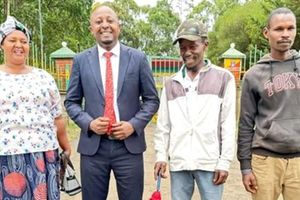
Members of the public at the scene where an angry mob lynched and burnt a suspected thug in Makutano town, West Pokot county on April 12, 2023.
James Kemboi, a man many people in Eldoret town known as "Teargas", has been in and out of prisons for various offences including robbery and burglary.
The last time he appealed and walked to freedom. Little did he know, his joy would be short-lived.
On the evening of November 11, 2024, he went to a kiosk at around 7pm, to buy milk, but the owner raised the alarm, claiming he wanted to steal from her.
Residents chased him and caught up with him in the Kipkaren area. They attacked him using stones and clubs with his desperate cries landing on none of the "judges."
He is handed a death sentence before police arrive at the scene to save him.
Whether he was indeed guilty is secondary as the mob served as a prosecutor, witness, judge, jury, and executioner.
For Kemboi, there is no chance for appeal—even if any new evidence comes up to prove his innocence.
This is just an example of the rising cases of mob violence, which has quickly become common in various parts of the country in the past months.
In what has turned into a lynching epidemic, victims are cornered by crowds and stoned, set ablaze, or beaten with clubs to death.
Shockingly, some of the victims are even dragged from police stations and lynched in broad daylight.
The majority of the suspects are believed to have committed crimes like robberies, murders, muggings, as well as mobile phones and bag snatching in the streets.
The rising ‘mob justice’ incidents indicate a worrying trend where victims are subjected to instant justice without the due court process as expected in law.
Although security authorities have warned that the trend is dangerous, members of the public argue that it is the best way to deal with criminals that mercilessly terrorise innocent citizens.
In the latest incident on January 3, 2025, more than 3000 irate residents of Tinderet in Nandi County, stormed Chemase Police Station and freed a murder suspect, before stoning him to death and subsequently burning his body.
The suspect, Victor Kimutai, 30, was being held in connection with the brutal murder of a 38-year-old man, whose body was found dismembered.
Tinderet Police Commander Johnson Mwariga said the suspect confessed to having committed the crime and even escorted investigating officers to where he had reportedly hidden the victim’s head and other body parts.
The residents went on a rampage and burned a police vehicle before overpowering the cops and making their way into the cells where they accosted the murder suspect.
National Police Service spokesperson Dr Resila Onyango warned members of the public against taking the law into their own hands.
“We are appealing to the members of the public to refrain from taking the law in their hands and let the law take its cause," said Dr Onyango.
“The destruction of police property like what was witnessed at Chemase Police Post when a police vehicle was burnt down by irate members of the public only hampers police efficiency in offering the much-needed services to members of the public. In the spirit of community policing, we urge the members of the public to cooperate with police to enhance security within our areas.”
Human Rights activist David Kuria, who is the Nakuru Human Rights Network (Nahurinet) Director, also urged the public to avoid taking the law into their own hands.
“All suspects should be handed to the police for prosecution. We have a law that should take its course, lynching a suspect is a capital criminal offence, “said Mr Kuria.
According to Mr Kuria, such happenings set a dangerous trend.
"There should be sensitisation campaigns between the judiciary, the police, and members of the public to enlighten them on the dangers of mob justice," added Kuria.
Mr Kuria described the trend as worrying if Kenyans embrace the “culture of taking the law into their own hands.”
Dozens of Kenyans have been killed in a series of other mob justice incidents. On October 30, 2024, two brothers were lynched on the outskirts of Thika town on suspicion of snatching a phone from a pedestrian.
The two brothers, 19 and 21, were killed a short distance from Makongeni Police Station.
Residents, who witnessed the incident, said two officers on patrol fled after they were threatened by the angry mob.
On October 27, 2024, a suspected motorcycle thief was lynched in Eldoret as police crackdown on a theft syndicate in the area intensified.
On November 11, 2024, a suspected phone snatcher was fatally burned by a mob in Eldoret, following an attempted robbery involving a young woman.
The woman raised an alarm drawing the attention of passers by. He was lynched before police arrived at the scene.
On July 10, 2024, irate residents of Gachocho village in Murang'a raided a police patrol base and stoned officers who fled, before dragging a murder suspect out of the cells and murdering him.
The locals said an eye for an eye was the only sure justice for them since they had no faith in the police station in the area.
"When reinforcement arrived, it was too late. Teargas and other crowd control methods were used, but we were unable to rescue the suspect who unfortunately succumbed to injuries inflicted by the mob," said Kigumo Police boss Kiprono Tanui.
On July 11, 2024, three people were stoned to death by a mob in a suspected kidnap case in a village in Butere, Kakamega County.
Investigations later revealed the incident happened out of a case of mistaken identity.
On May 28, 2024, an angry mob in Nyakach, Kisumu County, killed a man after his 18-year-old son called him a witch.
Valentine Ochieng was killed by an angry mob who invaded his home. The angry mob further went ahead to burn down four houses at the home of the suspect.
On March 20, 2024, police opened a probe into the death of two high school students, who were among three suspected robbers burnt to death in Kisumu on allegations of motorbike theft.
Boda boda operators cornered the three in Kisumu’s Manyatta estate and frog-matched them to an open field where a mob descended on them.
The mob accused the suspects of robbing a rider of his motorbike Monday night. The suspects, some of whom residents said were positively identified, robbed the cyclist and his pillion of valuables before fleeing the scene as others drove away with the motorbike.
On March 9 and 10, 2024, three people were lynched by burning in two days, in Bahati, Nakuru.
Two suspects were torched in the Kiamunyeki area, while the third one was burnt beyond recognition at Stoo Makaa along the Nakuru-Subukia road in Kiamaina ward.
However, lawyers warn that mob justice can be dangerous and costly.
Although such incidents are tedious to prosecute in court, culprits of mob justice can be charged with murder, a capital offence that attracts a lifetime sentence, according to lawyer Steve Kabita.
“Although it requires a higher threshold of evidence because the prosecution must prove their case beyond reasonable doubt, it can send a person to prison for a lifetime, “revealed Mr Kabita in an interview with the Nation.
In April 2017, 10 perpetrators in the mob lynching of Elikana Gondi Syongoh, a chief accountant at the Department of Defence, his driver, and his farmhand, were jailed for life after they were found culpable of the offence.
Mr Syongoh and the other two were lynched on the night of August 12, 2013, following an alarm by some villagers that cattle thieves had been spotted in Mwanche village in Migori County.
Mr Syongoh visited Migori County on the evening of August 12, 2013, alongside his colleagues. He was on a mission to increase his revenue streams.
Accompanied by his driver Moses Magiri and a caretaker, Simon Gombe, he had left his workstation in Nairobi to his Migingo village.
The three were mistaken for cattle rustlers, and beaten up before they were set ablaze in Mr Syongoh’s pick-up vehicle. Two were burnt beyond recognition.
Their protests of innocence fell on deaf ears as the blood-thirsty mob descended on them with pangas, sticks, stones, and other crude weapons.
Following the killing, police arrested 12 suspects, who were then charged in court. Four years later, a court ruled that the 10 men who were part of the mob be sentenced to death for murder.
The judgment was delivered in Migori by Justice David Majanja, who died last year.






